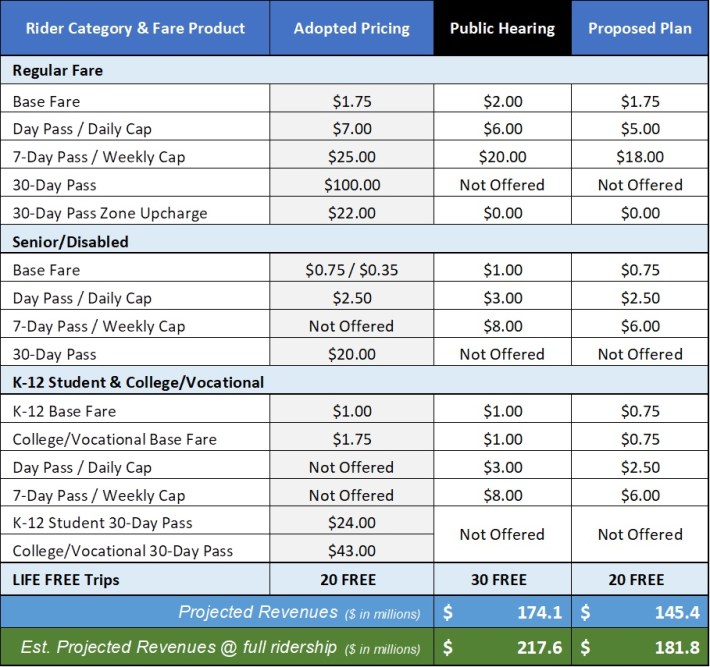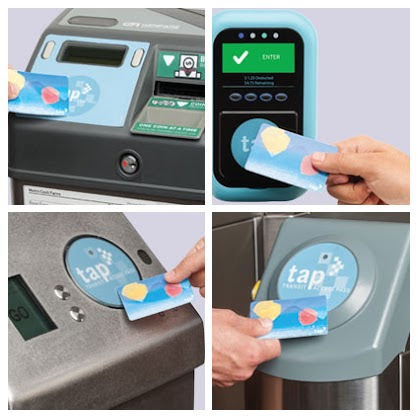Metro staff recently announced proposed fare increases, which transit advocates then soundly criticized. In a post at The Source last week, Metro backed off of some of the worst aspects of the proposal. The agency stated that it now plans to keep base fares at their current level of $1.75, and to continue to provide free transfers.
Note that transit fares provide a very small portion (around one percent) of Metro's overall revenue, which is mainly (more than half) from sales taxes.

The revised changes will go to a vote of the Metro board at its meeting [agenda, fare changes item 50 staff report] this Thursday December 1 at 10 a.m.
Metro's revised proposal has some positives.
Metro would implement fare-capping, which is generally good for equity as it allows riders to pay ride-by-ride up to the value of a daily/weekly pass. Many low-income folks struggle to pay the full up-front cost of a transit pass; with fare-capping these folks are not penalized for pay-as-you-go. Under Metro's revised proposal, daily and weekly fare caps would be cheaper than current pass prices. Today, a daily pass costs $7 and a weekly pass costs $25. In the revised proposal, these would cost $5 and $18 respectively. Under Metro's initial proposal, these day/week costs dropped; the revised version drops them further. (Monthly passes would be eliminated.) Metro had initially proposed that fare-capping would reset every Monday, but the revised proposal improves this this so it would begin any day a rider boards Metro.
A downside of fare-capping is that it would not be available to riders who pay cash. These riders would need to pay $2 for a TAP card, which would last for a decade; while this isn't too steep, it does represent a small burden for riders with very low incomes, as well as folks who don't live near a rail/BRT station where card vending machines are located. Metro is undertaking a "Cash to TAP" campaign to make cash riders aware of the benefits of TAP card use.
If approved this week, Metro anticipates that fare-capping would go into effect in Summer 2023.
The proposal includes a couple other minor steps in the right direction:
- Metro would decrease the student discounted fare price from $1 to $0.75, which matches other discounted fares. (Note that, for now, Metro's student fare is largely unused. The majority of students are eligible to ride free under Metro's student fareless program, which is currently approved through mid-2023.)
- Metro would eliminate its oddball vestigial $0.75 “Express Freeway Premium Charge” which currently basically penalizes riders on the few Metro bus lines that run on freeways.
- Metro would extend current half-off pass discounts through the start of fare-capping.
Most of the revised proposal is essentially neutral, keeping the current status quo in place.
Metro would continue to provide free transfers. Many (including transit expert Jarrett Walker) have asserted that transfers are an essential part of getting around via transit, so transit agencies should not penalize riders for transfers, but instead minimize the inconvenience of transferring. With the recent NextGen Bus Study system changes and increasingly important rail connections where Regional Connector and B/D Lines overlap, Metro transfers will continue to be as important as ever. The agency should never have considered eliminating transfers, and was smart to remove that component from their initial proposal.
Base Metro fares would remain the same: adults remain at $1.75, senior/disabled remain at $0.75. Every four years, Metro would automatically adjust base fares to keep up with inflation.
The revised proposal includes a few remaining steps in the wrong direction.
The proposal still eliminates deeper off-peak fares for seniors. Currently seniors pay just $0.35 to ride at off-peak times (encouraging trips at times when the system has excess capacity); these rides increase to $0.75.
Paragraph corrected 11/30. The proposal adds Metro's low-income fare program (called LIFE - Low-Income Fares is Easy) benefits part of the agency's fare structure. New LIFE enrollees would continue to receive a 90-day free pass. After the free months, all LIFE enrollees would receive 20 free rides each month.
The biggest negative is that it's not fareless. In a statement to Streetsblog, the Alliance for Community Transit (ACT-LA) noted, "While this fare proposal is a vast improvement for riders over Metro's original proposal, a proposal for universal fareless transit would address these ongoing concerns and put the region on our best path toward sustainable and equitable regional accessibility for all." Back in August 2020 (in what served as a distraction from Metro's 20 percent service cut) Metro received positive press and advocate praise for announcing that a universal fareless transit pilot was due in early 2021. The 'Fareless System Initiative' was later scaled back to just include (most) students. Eliminating fares would eliminate the costs associated with fare collection and fare enforcement. It would speed up boarding, meaning faster bus speeds, higher ridership, and cleaner air.






